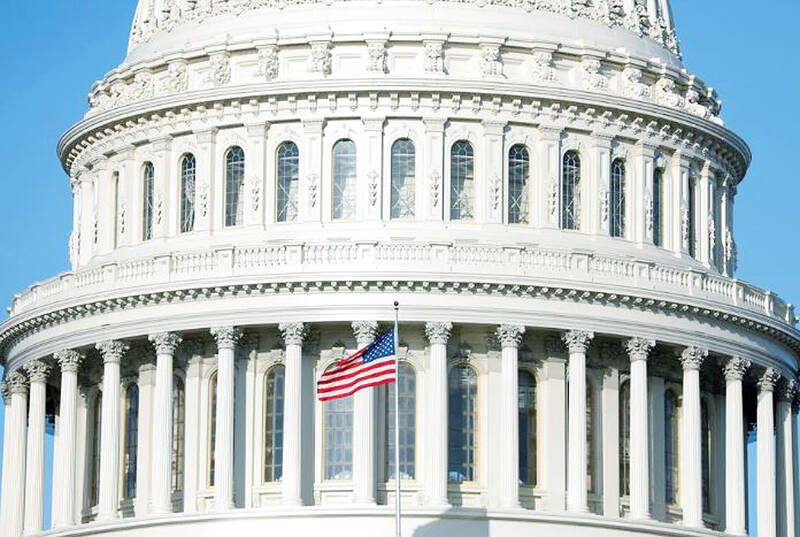The US Senate Committee on Armed Services on Friday passed a bill on the national defense policy and budget for the next fiscal year that includes provisions calling for military cooperation with Taiwan.
The US$886.3 billion budgeted under the National Defense Authorization Act (NDAA) was approved 24-1 by the committee, and has been sent to the Senate for approval.
An executive summary provided by the committee states that the US would seek to strengthen its posture in the Indo-Pacific region, in view of “long-term strategic competition with China and Russia.”

Photo: Reuters
Part of that effort includes the US establishing “a comprehensive training, advising, and institutional capacity-building program for the military forces of Taiwan,” the bill states.
It also calls for “engagement with appropriate officials of Taiwan for the purpose of expanding cooperation on military cybersecurity activities.”
The passage of the bill by the committee followed a similar pattern to corresponding legislation in the US House of Representatives, which was passed by the House Armed Services Committee 58-1 on Thursday.
According to the proposal, known as the “Chairman’s Mark,” put forth on June 12 by House Armed Services Committee Chairman Mike Rogers, the House version of the bill encourages joint military exercises between Taiwan and the US, as well as exchanges among officials on both sides.
The bill also urges the US government to support Taiwan in acquiring defense articles and services “through foreign military sales, direct commercial sales, and industrial cooperation” to help build up its asymmetric capabilities.
The bill awaits approval by the House.
Once the Senate and House approve their versions of the NDAA, they must negotiate a final bill that each body has to pass before it can be signed into law by the president.
In Taipei, Institute for National Defense and Security Research analyst Shu Hsiao-huang (舒孝煌) yesterday said that the US Congress is sending a clear signal to the White House that the US must broaden its defense cooperation with Taiwan, including joint exercises to improve interoperability.
The Pentagon has repeatedly underscored interoperability of command and control as a key capability that the US and allied forces must obtain in joint exercises, he said, adding that this would significantly augment the combat performance of a military coalition.
The US conducts joint exercises with South Korea, Japan, the Philippines and Indonesia, which comprise the entirety of the first island chain minus Taiwan, leaving a gap in capabilities, he said.
Current military exercises carried out by Taiwan and the US do not qualify as true joint exercises, he said.
Taiwan-US defense cooperation is conducted too sporadically and does not include senior commanders, which means the methods of waging modern war on a large scale and fresh ideas from the US cannot be learned, Shu said.

Right-wing political scientist Laura Fernandez on Sunday won Costa Rica’s presidential election by a landslide, after promising to crack down on rising violence linked to the cocaine trade. Fernandez’s nearest rival, economist Alvaro Ramos, conceded defeat as results showed the ruling party far exceeding the threshold of 40 percent needed to avoid a runoff. With 94 percent of polling stations counted, the political heir of outgoing Costa Rican President Rodrigo Chaves had captured 48.3 percent of the vote compared with Ramos’ 33.4 percent, the Supreme Electoral Tribunal said. As soon as the first results were announced, members of Fernandez’s Sovereign People’s Party

EMERGING FIELDS: The Chinese president said that the two countries would explore cooperation in green technology, the digital economy and artificial intelligence Chinese President Xi Jinping (習近平) yesterday called for an “equal and orderly multipolar world” in the face of “unilateral bullying,” in an apparent jab at the US. Xi was speaking during talks in Beijing with Uruguayan President Yamandu Orsi, the first South American leader to visit China since US special forces captured then-Venezuelan president Nicolas Maduro last month — an operation that Beijing condemned as a violation of sovereignty. Orsi follows a slew of leaders to have visited China seeking to boost ties with the world’s second-largest economy to hedge against US President Donald Trump’s increasingly unpredictable administration. “The international situation is fraught

MORE RESPONSIBILITY: Draftees would be expected to fight alongside professional soldiers, likely requiring the transformation of some training brigades into combat units The armed forces are to start incorporating new conscripts into combined arms brigades this year to enhance combat readiness, the Executive Yuan’s latest policy report said. The new policy would affect Taiwanese men entering the military for their compulsory service, which was extended to one year under reforms by then-president Tsai Ing-wen (蔡英文) in 2022. The conscripts would be trained to operate machine guns, uncrewed aerial vehicles, anti-tank guided missile launchers and Stinger air defense systems, the report said, adding that the basic training would be lengthened to eight weeks. After basic training, conscripts would be sorted into infantry battalions that would take

GROWING AMBITIONS: The scale and tempo of the operations show that the Strait has become the core theater for China to expand its security interests, the report said Chinese military aircraft incursions around Taiwan have surged nearly 15-fold over the past five years, according to a report released yesterday by the Democratic Progressive Party’s (DPP) Department of China Affairs. Sorties in the Taiwan Strait were previously irregular, totaling 380 in 2020, but have since evolved into routine operations, the report showed. “This demonstrates that the Taiwan Strait has become both the starting point and testing ground for Beijing’s expansionist ambitions,” it said. Driven by military expansionism, China is systematically pursuing actions aimed at altering the regional “status quo,” the department said, adding that Taiwan represents the most critical link in China’s